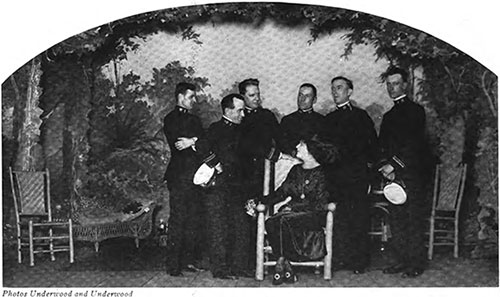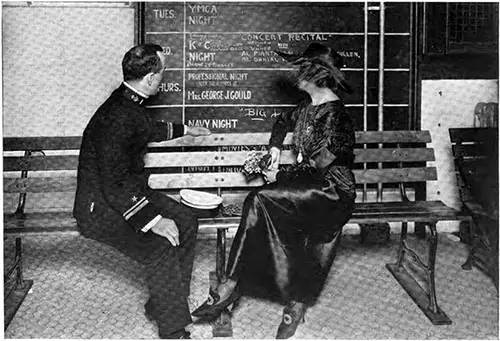A Thimble Theatre Performance on Ellis Island: Music as a Refuge for Immigrants (1916)
📌 Discover how The Thimble Theatre's performance on Ellis Island in 1916 provided emotional respite for detained immigrants. Explore the role of music in creating a sense of solidarity and humanity amidst uncertainty and bureaucratic delays.
A Performance By The Thimble Theatre On Ellis Island (1916)
Relevance to Immigration Studies
The article "A Performance By The Thimble Theatre On Ellis Island (1916)" offers significant insight into the role of cultural exchange in the immigrant experience, especially in the context of Ellis Island, the primary gateway for immigrants arriving in the United States.
For historians, genealogists, teachers, and students of immigration studies, this article serves as a valuable resource that not only explores the human side of immigration but also illustrates how immigrants, even in the midst of uncertainty and potential deportation, found moments of joy and solidarity through cultural events like performances by The Thimble Theatre.
The article highlights how such events served as a bridge to enhance the emotional and social well-being of immigrants detained on Ellis Island, providing a fascinating lens through which to examine the social dynamics of the early 20th-century immigrant experience.

Mrs. Gould, Lieutenant Murray and staff on the stage of the Ellis Island Theatre © 1918 Underwood and Underwood. | GGA Image ID # 2193e5d5de
The Thimble Theatre, a renowned cultural ensemble, embarked on a significant journey last week. The entire ensemble of last Saturday night, in response to an invitation from the chief clerk, Augustus Sherman, of Ellis Island, repeated their performance. This event was not just a show, but a gesture of solidarity and support for the immigrants detained on Ellis Island.
More than four hundred men, women, and children from all corners of the globe gathered, united by a love for music, a universal language that transcends borders. This cultural exchange, reflected in the faces of those whom the United States did not initially welcome, enriched their experience and broadened their horizons, fostering a sense of inclusivity and shared humanity.
There were well-dressed men and women of Northern Europe right next to Russian peasant women's mannish, hard-set faces. Next to a countenance upon which was written the simplicity of mind sat a man whom you would not wish to meet at night in a dark alley.
Among the audience were hosts of children, in all stages of life. Mr. Sherman shared that some of his charges had been ordered deported as far back as eighteen months ago, but due to the present European complications, most of the orders cannot be carried out. Despite the uncertainty of their fate, the people displayed remarkable resilience and adaptability, inspiring all who witnessed their strength.

“All sorts and conditions”—a typical audience at Ellis Island © 1918 The Theatre Magazine. | GGA Image ID # 2194015f72
The Sunday afternoon concerts are held in a building similar in size to an armory. The acoustics are rather bad, but the audience was very appreciative, and the artists did their best to add a few pleasant hours to the lives of these poor, involuntary residents of the Island. Miss Foster's Irish Ballads and Miss Edens' folk songs evoked the enthusiasm of the listeners.
Mr. Keeler's recitation of children's poems and nursery rhymes, with his phonetic interpretation of sounds dear to the ears of the little ones, which evidently must Le the same all over the world, gathered around him girls and boys who wanted each time just a little bit more and his recitation lasted quite longer than had been intended.

“The Entertainment Bulletin” announces the “prescription of happiness” for each night. Lieutenant Murray, Commandant of the Naval Receiving Station at Ellis Island and Mrs. George Jay Gould © 1918 The Theatre Magazine. | GGA Image ID # 21941d7d78
The concert on the Diamond Disc, a selection of operatic airs in several languages, old hymns, and chorales, concluded the program. It was amusing to watch the little ones seated in the first rows and nearest to the instruments. They didn't know where the voices and the music came from, and it is doubtful if their parents, whom they questioned wonderingly, were able to give a proper answer.
The Sunday afternoon concert, one of the many humanitarian innovations Mr. Sherman has implemented, is looked forward to eagerly by the detained immigrants; this is more proof that music, good music, finds a quick response in the heart of every human being, even if he doesn't know the technical meaning of what he hears and of what appeals to him.
Bruno, Guido, Ed. "Charles Edison's Little Thimble Theatre - A Performance On Ellis Island," in Bruno's Weekly, Volume MCMXVI, No 3 January 15, 1916.
Key Highlights and Engaging Content
Cultural Solidarity and the Role of Music: The performance by The Thimble Theatre, which took place on Ellis Island, emphasizes music as a universal language that connects people from diverse backgrounds. The performance brought together immigrants from various corners of the world, showcasing the power of shared cultural experiences.
The audience was described as a diverse mix, including well-dressed men and women from Northern Europe, as well as Russian peasants, highlighting the melting pot that was Ellis Island. The concert's ability to momentarily transcend the language barriers and cultural divides presents a deeply humanizing aspect of the immigration process, emphasizing inclusivity and commonality.
Diverse Audience Reactions and Contributions: The article also notes the resilience and adaptability of the immigrants, some of whom had been detained for months or even years due to bureaucratic delays or geopolitical factors such as the ongoing European conflicts.
Despite their uncertain fate, these individuals found comfort and inspiration in the performance, reflecting the emotional strength that often goes unrecognized in the historical narratives about immigrants.
Humanitarian Innovations by Mr. Sherman: Augustus Sherman, the chief clerk at Ellis Island, introduced various humanitarian innovations such as these Sunday afternoon concerts, which aimed to ease the emotional toll of detention.
The concerts not only served as a source of entertainment but also as a meaningful cultural experience for immigrants waiting for their fates to be determined. These events gave detainees something to look forward to, showing the thoughtful ways in which Ellis Island authorities tried to make the detention process more bearable.
Charming Personal Accounts: The performances described in the article, such as Miss Foster's Irish ballads, Miss Eden's folk songs, and Mr. Keeler's recitations, create a vivid and personal image of the concerts, making it easy for readers to imagine the scene.
The lively accounts of children's enjoyment and the emotional response of the audience, despite often difficult circumstances, offer a powerful reminder of the importance of the arts in providing emotional respite and fostering a sense of community.
📸 Noteworthy Images
📌 Mrs. Gould, Lieutenant Murray, and Staff on Stage at Ellis Island: This image captures a moment from the actual performance, placing a human face on the administrative and humanitarian work happening at Ellis Island. The inclusion of prominent figures like Mrs. Gould and Lieutenant Murray underscores the involvement of influential individuals in supporting these immigrant-centric initiatives.
📌 "All Sorts and Conditions" – A Typical Audience at Ellis Island: This iconic image from 1918 shows the diverse mix of people in the audience, further emphasizing the theme of cultural and social diversity. The variety of immigrants from different backgrounds who gathered to experience the concert highlights the global nature of the immigrant community at Ellis Island.
📌 The Entertainment Bulletin – A Prescription of Happiness: The image of the Entertainment Bulletin not only serves as a physical reminder of the effort to bring joy to the immigrants but also ties back to the broader context of Ellis Island’s role in managing the emotional needs of those awaiting entry.
Educational and Historical Insights
This article is invaluable for anyone studying the cultural dynamics of immigration, particularly during the early 20th century. It offers a unique perspective on Ellis Island by illustrating how the immigrant experience was not limited to bureaucratic processes and physical examinations but also involved a form of cultural integration.
The concerts played an important role in humanizing the process and offering an emotional outlet for immigrants who were otherwise isolated in an unfamiliar land. The article also offers a glimpse into the development of cultural programs at government institutions, marking the early intersection of humanitarian efforts and entertainment within the immigrant experience.
Final Thoughts
The article offers an enriching view of the social and emotional impact of Ellis Island, often overshadowed by the narrative of strict immigration processes and the focus on entry requirements.
The performance by The Thimble Theatre on Ellis Island reveals the efforts made by some authorities to provide psychological and cultural support to immigrants, while also providing readers with a glimpse into the diverse and vibrant immigrant community that sought refuge and opportunity in the United States.
Music, in this case, transcends its entertainment value and becomes a vital tool for human connection in a difficult and often dehumanizing process. This cultural aspect of immigration history is often overlooked, making this article a valuable addition to any study of early 20th-century immigration in the U.S.
🔎 Research & Essay Writing Using GG Archives
📢 This is NOT a blog! Instead, students and researchers are encouraged to use the GG Archives materials for academic and historical research.
🔎 Looking for primary sources on Titanic’s lifeboat disaster? GG Archives provides one of the most comprehensive visual collections available today.
